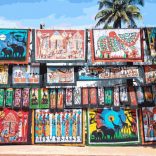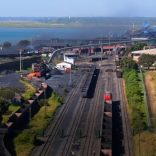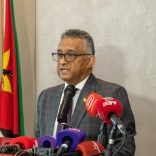Mozambique and Brazil to boost bilateral trade - AIM report
Mozambique is “sinking” into resource dependency – Carlos Lopes

File photo: Folha de Maputo
The former UN Deputy Secretary-General and current High Representative of the African Union for Partnerships with Europe, warned on Sunday that Mozambique is “sinking into dependency” on its natural resources rather than on structural reforms.
“Mozambique is not a country that is making reforms to transform its economy structurally. It is rather a country that is sinking more in rentier dependence,” said Guinean Carlos Lopes, who was Kofi Annan’s deputy secretary general at United Nations.
Lopes refers to countries living on the income of their natural resources, without adding value or using them to improve the economy as rentier states.
The former United Nations leader, who is also a professor at the Nelson Mandela University in South Africa, says Mozambique “has extraordinary wealth”. “The country’s gas reserves are equivalent to the gas wealth of a country like Qatar,” he notes.
Therefore, according to a man considered to be one of the 100 most influential people on the African continent, there is no shred of doubt that Mozambique is “potentially” one of Africa’s richest countries.
“I think that, from the point of view of natural resources, maybe the only country richer than Mozambique is the Democratic Republic of Congo. Apart from them, Mozambique is the richest country from the point of view of known natural resources,” he commented.
But “much caution is needed in the way the wealth is governed”, he warned. “If you start to get hidden debts before you even spout anything out of the ground – there is not even a cubic meter of gas produced and there are already gas-related debts – it is something very worrying.”
As far as concerns a vision for the future for the country, Lopes believes that it will emerge from civil society itself and is far beyond political parties.
“We hope that the government will now take the necessary measures, but we have at least assured that there are shocks within Mozambican society and there are many people who denounce, disagree and protest,” he said in an interview with Lusa in Lisbon, where he received the “Prize José Aparecido de Oliveira” from the Community of Portuguese Speaking Countries (CPLP) on Thursday, which had already been awarded to him previously, in 2016.
“With all due respect for the Mozambican political parties, I think the fundamental issue of Mozambique transcends their health and stability,” he added.
“What is at stake is a project and a strategic vision to integrate natural resources in a modern country – Mozambique has this advantage, which can quickly become a disadvantage if it does not have a strategic vision,” he commented.
This strategic vision has to emerge, and not necessarily from within the parties. It may come from the main economic, intellectual or organised civil society players.
“Mozambique has demonstrated in the past to have a great capacity for intellectual discussion. It needs to restore these capacities, this tradition, and from there take advantage of its natural resources,” the Guinean professor said.
As for how the African Union looks at the country, Carlos Lopes said: “It looks at Mozambique as it does at all countries that have governance problems.” But he believes that Mozambique “is a good problem to have because it is a rich country”.
Carlos Lopes represents the African Union in relations with Europe, and where he is part of a group of African cadres selected by the President of Rwanda, Paul Kagame, chairman of AU, to make economic reforms.
“So now, what it must do is to figure out how to make something potentially positive with this wealth , and not turn it into a Dutch disease of gigantic proportions,” he warned.
In the area of extractive industries – and because there are many countries in the African continent with such a sector – the African Union has created a document called “African Mining Vision” that serves as a guide for states to fashion “more holistic policies in extractive industries, and eventually create a value chain around them”, he said.
In this context, he noted that Mozambique has aluminium, which it should transform rather than just exporting. “But for this it needs electricity,” he said. And “what is curious is that the country exports that electricity to South Africa instead of using it to power its aluminium industry”.
This type of “incongruity”, in Lopes’s opinion, comes from the “carrying on of established policies without a pause to reflect in new contexts”.
This is what has to change, he concluded.












Leave a Reply
Be the First to Comment!
You must be logged in to post a comment.
You must be logged in to post a comment.